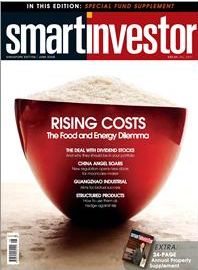
Article reproduced from Smart Investor with permission.
DIVIDEND STOCKS may sound like a boring option to investors. But as uncertainty clouds over the stock market, they may prove useful after all.
Inflationary pressures, the credit crisis and a slowing economy could be what many deem to be a wake-up call for individuals to be cautious with their spending and finances. With such doubt looming over the market, dividend stocks are a sensible addition to one’s portfolio.
A SAFE BET
According to Gabriel Yap, senior dealing director of brokerage firm DMG & Partners Securities, dividend stocks tend to pay higher dividends relative to the market. “If you're talking about Asia for example, the dividend yield is usually about three, three-and-a-half per cent. So any stocks that basically pay higher than that benchmark will tend to be considered as higher dividend yield stocks," says Mr Yap.
Dividend yield basically provides a measure of how much return the shareholder will get and is computed by dividing the estimated payout that a listed company issues at the end of the year over the price with which an investor bought the shares.
The ability to withstand market shocks is what makes dividend stocks attractive. An economic slowdown spurs investors to deviate towards the defensive, and dividend stocks provide one way to hedge against risk. Mr Yap says such stocks pay stable dividends going forward and are not trading at very high price-to-earnings ratios.

Gabriel Yap of OSK-DMG Securities
He cites transport, telecommunications, utilities and power sectors as examples.
He says while they are generally synonymous with blue-chip companies, it does not apply in all cases. “Blue-chip companies are subject to the cyclicality of businesses. A very good example is the airline industry, which used to be a blue-chip sector and therefore, paying stable dividend.”
Corporate governance is another reason dividend stocks are usually associated with blue-chip companies. “They tend to be bigger companies and are actually entrenched in their businesses, some of them for as long as 50 years," says Mr Yap, pointing out F&N, Hongkong Land and Jardine Strategic as prime examples.
“The earnings that they get tend to be very stable and therefore, they are in the position to pay stable dividends for the next couple of years, going ahead.”
As dividend stocks are long-term investments, they will ride out periods of inflation. But investors should take note that this is not the case for the immediate term. “Unless a particular high paying dividend company is able to jack up its own sale price…and because of its higher earnings and ability to pay higher dividends, most of the stocks generally will not be able to protect against inflation risks,” says Mr Yap.

Lee Wen Ching of OCBC Investment Research
When it comes to building a passive income, dividend stocks can be considered for a long-term portfolio. Lee Wen Ching of OCBC Investment Research says they provide a regular income stream for passive investors.
“A high dividend yield stock would be more attractive because they can buy into a stock and accumulate dividends over the years,” says Miss Lee. She recommends a balanced portfolio of dividend stocks and growth stocks but maintains that portfolio management depends on risk appetite and investor goals.
Mr Yap agrees with this sentiment. “It is actually a good idea to have some dividend stocks in one’s portfolio,” he says, adding that while dividend stocks do yield more than government bonds or fixed deposits, their prices do not appreciate sharply.
“If you’re at a young age, where you’re only starting off to build your portfolio, then it is probably more advisable to have a lower level of dividend stocks in your portfolio, says Mr Yap. “Because what you would probably want is capital appreciation and therefore capital gains arising from stocks.”
THE LOWDOWN ON LOW-RISK INVESTMENTS
Low-risk bonds may offer secure returns too, but dividend stocks are considered to be more profitable. They do not offer capital appreciation but only returns in yield-to-maturity levels. Depending on the length of maturity, which range from two to 15 years, Singapore government bonds offer a yield of two-to-four per cent.

A high dividend yield is not indicative of growth.
Principal investments will also be held until the bonds have reached their maturity date. “If you have bought bonds at a discount to the maturity level or the nominal value, then that represents your only return,” says Mr Yap.
But he feels that while dividend stocks have higher share returns, they are a notch higher on the risk meter. As government bonds do not fluctuate, Miss Lee also considers them to be more secure than dividend stocks. “In a sense your principal is guaranteed.
It’s low-risk, low return,” says Miss Lee. “For bonds you won’t have to worry if your principal gets wiped out, but for stocks, there is no guarantee for your principal.”
However, Miss Lee mentions that shipping trusts have comparable dividend yields to those of dividend stocks.
“The trust structure unitises capital-intensive assets…into liquid and affordable units that aretraded on the Singapore Exchange,” says Miss Lee. And at such attractive yield levels, they give blue-chip dividend stocks a run for their money – according to OCBC Investment Research, their average distribution per unit (DPU) yields are about 11.7 per cent.
She also feels that such trusts are defensive plays and will safeguard against market volatility. “Companies are restricted to paying dividends out of their accounting profits,” remarks Miss Lee.
“Business trusts like the shipping trusts can and do pay distributions to investors out of operating cash flows. As a result, trusts typically have high payout ratios.” She also adds that due to long lease terms, they have a higher cash flow visibility.

At 34 cents, Second Chance Properties is yielding 10% in dividends. Its properties' tenants include those above.
But according to UOB Kay Hian’s November 2007 shipping sector report, shipping trusts are not without their risks – charterers could default on their payments and re-negotiate contracts due to an economic downturn and hence, “long-term contracts alone are generally insufficient to secure cash flows over a long period of time”.
LOOK AT MORE THAN JUST DIVIDEND YIELDS
Experts emphasise that aside from dividend yields, investors should research the company’s track record and earnings. “Whether a stock pays a high or low dividend depends on the stability of its business,” says Mr Yap.
“The stability of its business is interdependent on the cash flow that the business is able to generate,” continues Mr Yap, underlining that if a company’s fixed level of investments is very low, it could be due to its “mature phase of development” and thus, one cannot expect rapid growth. Mr Yap cites the utilities, power and petrochemical industries as examples of mature sectors that could possibly pay high dividends.
Johnny Kwon from SIAS (Securities Investors Association of Singapore) Research feels that analysing a stock’s dividend payout will reveal its quality. He says investors need to be aware that troubled stocks also bear high dividend yields.
“If the yield is very high due to market sentiment, like the current market uncertainty, then it might suggest the share price has been beaten down due to fear rather than due to poor stock quality,” notes Mr Kwon.
“Investors need to be sure of the quality of the underlying stocks, the consistency of the dividend and the going concern status of the company.”
Mr Yap feels that when it comes to stock picking, a stock’s total share returns is a more constructive way to gauge its value and sustainability.
“It is able to capture the steady dividend yield plus the possible capital appreciation in investment in a particular stock. So it is a more comprehensive measurement to say dividend yield alone,” says Mr Yap.

A risk of some high-dividend stocks is that their past dividend payouts may not be offered again.
Related stories:
SECOND CHANCE PROPERTIES: Dividend yields of 8-9%
MTQ: Record profits, record dividends







